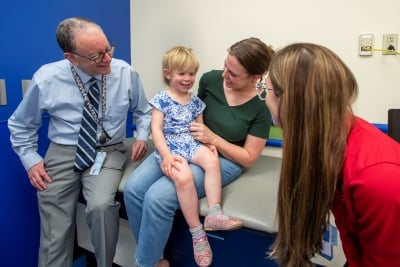Craniofacial Program

Craniofacial Program

With one of the most experienced and largest teams of specialists in the nation, the craniofacial program at Children’s Mercy treats a full range of complex conditions. From craniosynostosis to more rare conditions, we provide care for the whole child from birth into adulthood.
Why Children’s Mercy
The craniofacial team at Children’s Mercy ranks among the top 3 percent nationally in patients seen per year. That volume means our experienced team of fellowship-trained, board-certified surgeons is among the national leaders in treating craniofacial conditions. We’re a certified Center for Craniofacial Surgery and the only pediatric craniofacial program in the nation with two members of the International Society for Craniofacial Surgery .
Being a part of Children’s Mercy means patients who are treated in our clinic have access to the full range of pediatric services at a nationally-ranked children’s hospital. This includes anesthesia provided by anesthesiologists who specialize in sedating children, as well as collaboration with our Fetal Health Center, genetics department, and our Level IV NICU.
Additionally, we work with psychologists and social workers to incorporate psychosocial care into your child’s treatment plan.
Our approach to care
We believe it’s important to provide families with all options for treatment and care. Craniofacial conditions can be complex and often impact multiple areas of a child’s health. This means there is no one-size-fits-all approach. We focus on each individual patient and family and are prepared to treat patients from birth to young-adulthood. We work to use the latest technology and minimally invasive procedures whenever possible.
Additionally, we work with child life, psychologists, and social workers to incorporate psychosocial care into your child’s treatment plan.
The Children’s Mercy JAWS Clinic provides a single point of contact for patients with jaw deformities that often require the expertise of specialty providers from several fields. “JAWS” stands for jaw, airway, and sleep.
-
Orthodontic Services
-
Reconstructive Surgery
-
Skin Anomalies
Conditions
At Children’s Mercy, our extensive experience in treating childhood craniofacial conditions means we are equipped to handle nearly any diagnosis. Below are some, but not all, of the conditions we treat:
-
Craniosynostosis
-
Positional plagiocephaly
-
Hemihyperplasia
-
Hypertelorism
-
Rare & complex syndromes
-
Small jaws with airway obstruction
-
Skull defects
In addition to these conditions, we treat all other craniofacial conditions like facial trauma, skull defects, facial asymmetry, underbites, overbites, and congenital nasal deformities.
Your appointment

We can typically see patients within 1-2 days of an appointment request, if desired. Many families come to us via referrals from their primary-care physician, but families may also schedule appointments directly with our clinic. We also offer prenatal consultations and telemedicine, and we are also available for second opinions.
At your first appointment, you will meet with multiple members of our care team, from different areas of the hospital. This varies by your child’s diagnosis, but common departments we work alongside include genetics, nutrition, orthodontics, ENT, social work, and speech language pathology. This type of care environment gives you the convenience of scheduling fewer appointments, reducing your overall time spent at the hospital.
Our innovation
As national leaders in craniofacial surgery and treatments, we are constantly working to develop new ways of treating our patients. We are also often invited to speak at national meetings and train other physicians around the nation.
Some of our innovations include:
-
Blood conservation program. We give patients pre-operative medications to decrease blood loss during surgery, reducing the need for transfusions. This makes surgery safer and improves outcomes for all patients.
-
We offer both minimally invasive endoscopic techniques and open techniques for surgery, making us among the few programs offering both types of surgeries.
Our team actively works with industry leaders to develop novel instruments and techniques that help us remain at the forefront of innovations in craniofacial and maxillofacial surgery.
